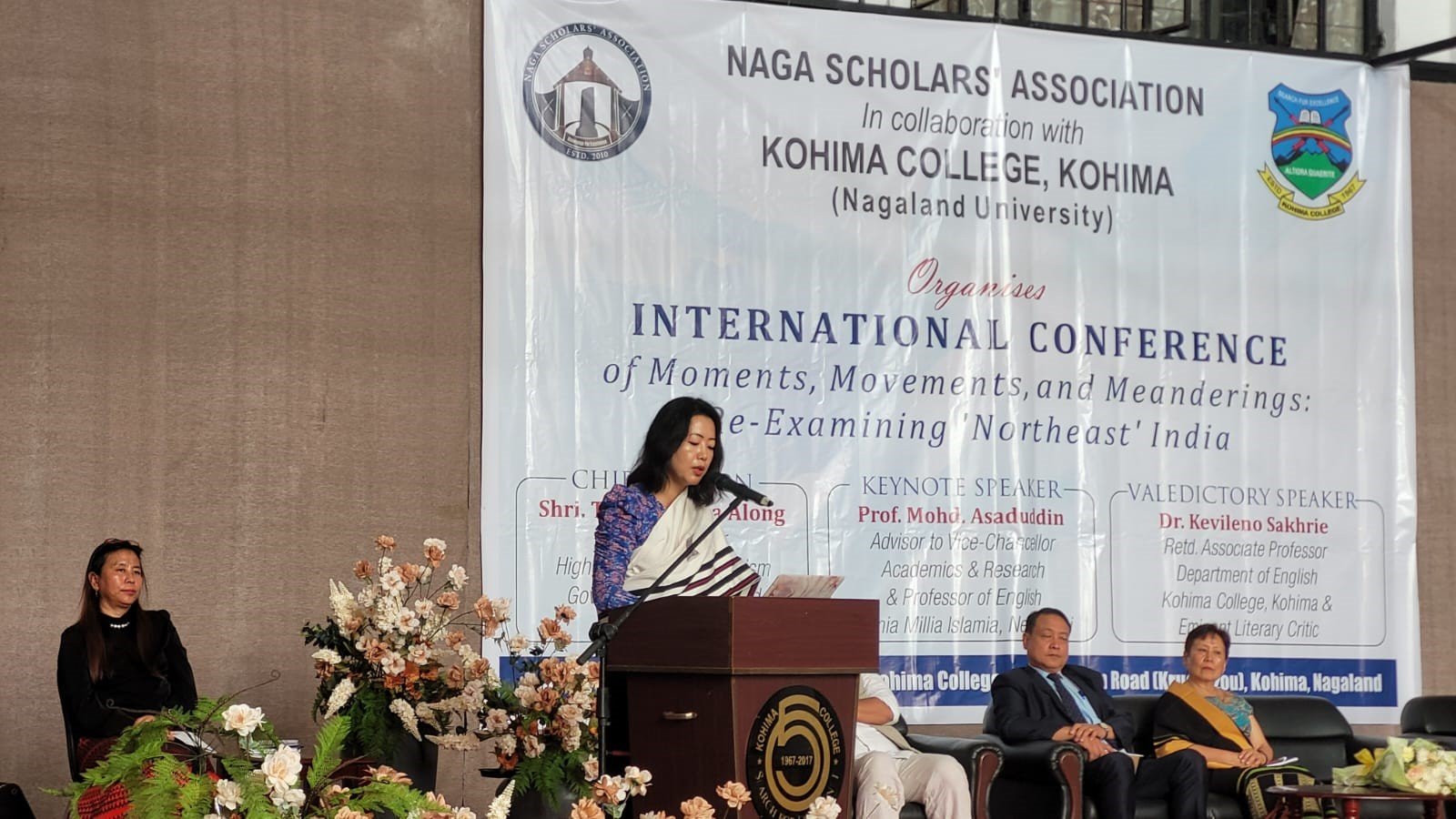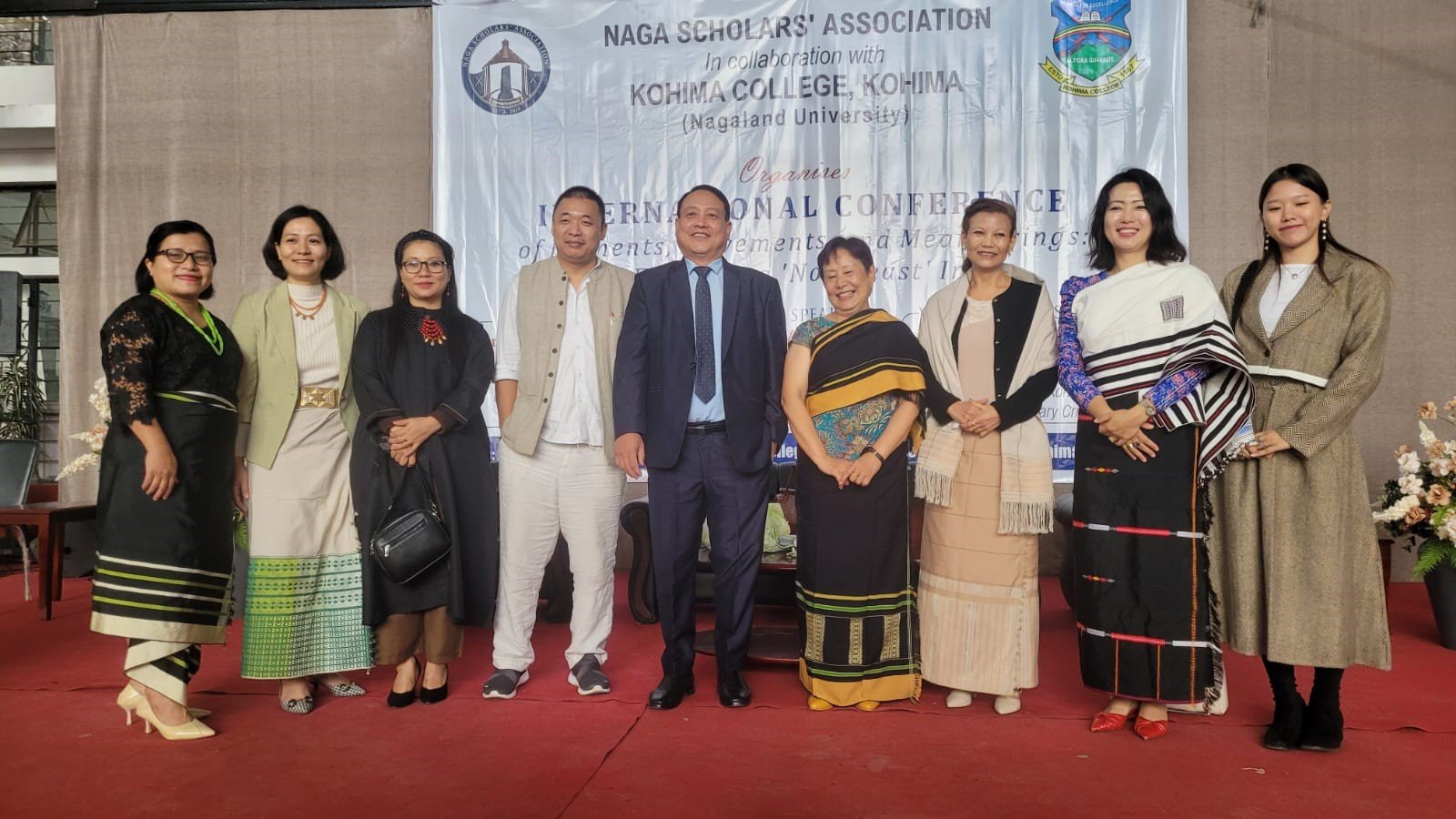Kohima College in collaboration with Naga Scholars’ Association inaugurated the two-day International Conference under the theme “International Conference of Moments, Movements and Meanderings: Re-examining Northeast India” on October 27.
Delivering the keynote address on behalf of Prof. Modh Asaduddin, Dr. Theyiesinuo Keditsu spoke on the ‘Writings from India’s North East: A contemporary view’ to the gathering. Due to a health condition, Prof. Modh. Asaduddin could not be present for the August conference.
The keynote address detailed about the contemporary view of writings from India’s North East and its developments, the transitions from oral to the written, the development of English writing in the hill states and valleys, writing systems and literary influence as a whole.
“We are at a historical juncture where there is openness and curiosity about literatures from the Northeast. English and MIL departments throughout the country have expanded their canons to embrace writings from the Northeast. Publishers are more ready than ever before to publish literatures from the Northeast. I would assert that both the politics and economics, along with the trend in the academia at this moment are conducive to the growth and dissemination of this body of literature,” opined Asaduddin.
The Scholar also asserted that Shillong has proved to be a fertile ground for writers in English, so much so that it will not be inappropriate to talk about a Shillong school of writing. The writers who come to mind, according to Prof. Asaduddin, most obviously are – Siddarta Deb, Dhruba Hazarika, Anjum Hasan, BelinderbDhanoa and Bijoya Sawian. “Though these writers have moved away from Shillong in pursuit of their careers this does not take away from the fact that they have recreated a phase of the history and culture of the place that will survive in their works,” viewed the Scholar.

Download Nagaland Tribune app on Google Play

Drawing attention to the immense diversity within the umbrella term ‘Naga’ that includes at least 66 Naga tribes – 17 in Nagaland, 15 in Manipur and 3 in Arunachal Pradesh, Prof. Asaduddin stressed on the contributions of two Naga writers- Temsula Ao and Easterine Kire who have registered the presence of Nagaland and the Ao community in particular in the literary map of the country.
“All the tribes are passing through a transitional period from orality to script-based epistemology and knowledge,” he said further quoting Easterine Kire , “I felt the need to create written Naga literature. We have so much of oral narratives, but with orality dying out, it’s all going to be lost.”
Sharing the contributions and works of Temsula Ao, the Scholar viewed that Ao’s ethnographic experience is reflected in her short stories, most of which depict the lives, customs and struggles of the Naga people. “Her narrative style replicates the oral style of narration found in the folktales. Her stories, while depicting the cultural lives of the Nagas, also act as narratives of the violence that has torn the state apart in the form of both militant and state violence,” stated Prof Asaduddin, adding that during Ao’s tenure as the Chairperson of the Nagaland State Commission for Women, she was very vocal for women’s rights in the state often challenging traditional status quo and seeking progressive legislation.
“In recent years, one can see a paradigm shift in writings from the North-East. The stereotype of a strife-torn and conflict-ridden society dishing out tales of violence and gore has given way to a recuperative effort to search for roots and reclaiming of past history and traditions. There is an effort to find one’s own place in the general scheme of things. The writers valiantly confront and resist their perceived marginality and peripharelity and are finding their rightful place in the reading lists of colleges and universities not only within the country but worldwide, there are many fissures and fault lines that need be addressed in the process of canonising literatures from the Northeast,” remarked the Scholar exuding optimism that the papers presented in the conference and the discussions and debates generated will help acknowledge and address these issues.
Speaking about the conference, Dr. Theyiesinuo Keditsu expressed that the Conference sought to re-examining the North East region. “We have scholars from all over the country and abroad as well as scholars from Nagaland coming to share their papers and exchange ideas. We are really hoping that this will be an occasion to create new connection and networks and encourage more academics to pursue their work,” said Dr. Keditsu.

Earlier, Dr. Vitsosie Vüprü, Principal Kohima College delivered the welcome address, while the vote of thanks was proposed by Zeneinuo Solo, Associate Professor & Head Dept. of Political Science, Kohima College, Kohima. The programme was chaired by Lily Angami, Associate Professor & Head Dept of Economics, Kohima College. Meanwhile, the Kohima College Choir also performed “A Million Dreams”.

